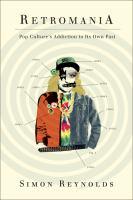
20th anniversary editions of indie-pop albums stuffed with previously unheard tracks. Reunions of bands who swore they’d never again play together. Japanese retro-punk. Mass-produced faux-vintage t-shirts. Hollywood remakes. Nostalgia for a previous golden age of nostalgia.
These are only the tip of the cultural icebergs author Simon Reynolds investigates in his eminently readable Retromania: Pop Culture’s Addiction to Its Own Past. It’s easy to overlook how much of today’s pop culture is based on ideas and interpretations about the (mostly recent) past. Reynolds argues that the 2000s have been dominated by an excess of the ‘re’-prefix: “revivals, reissues, remakes, reenactments. Endless retrospection: every year brought a fresh spate of anniversaries, with their glut of biographies, memoirs, rockumentaries, biopics and commemorative issues of magazines.” What happens to the cultural present, let alone its future, when so much of what defines us is rooted in some form of retrospection?
Reynolds’s discussion about music’s endless references to the past is itself exhaustive. However, his analysis doesn’t stop there. Particularly interesting is the chapter on the fashion world’s obsession with retro styles, which in Reynolds’s words are a “mad scramble to pillage the past as soon as a decent-enough interval has passed.”
For anyone interested in pop culture studies, especially other great books like David Sirota’s Back to Our Future: How the 1980s Explain the World We Live in Now--Our Culture, Our Politics, Our Everything and I Want My MTV: The Uncensored Story of the Music Video Revolution, Retromania is a must-read.
